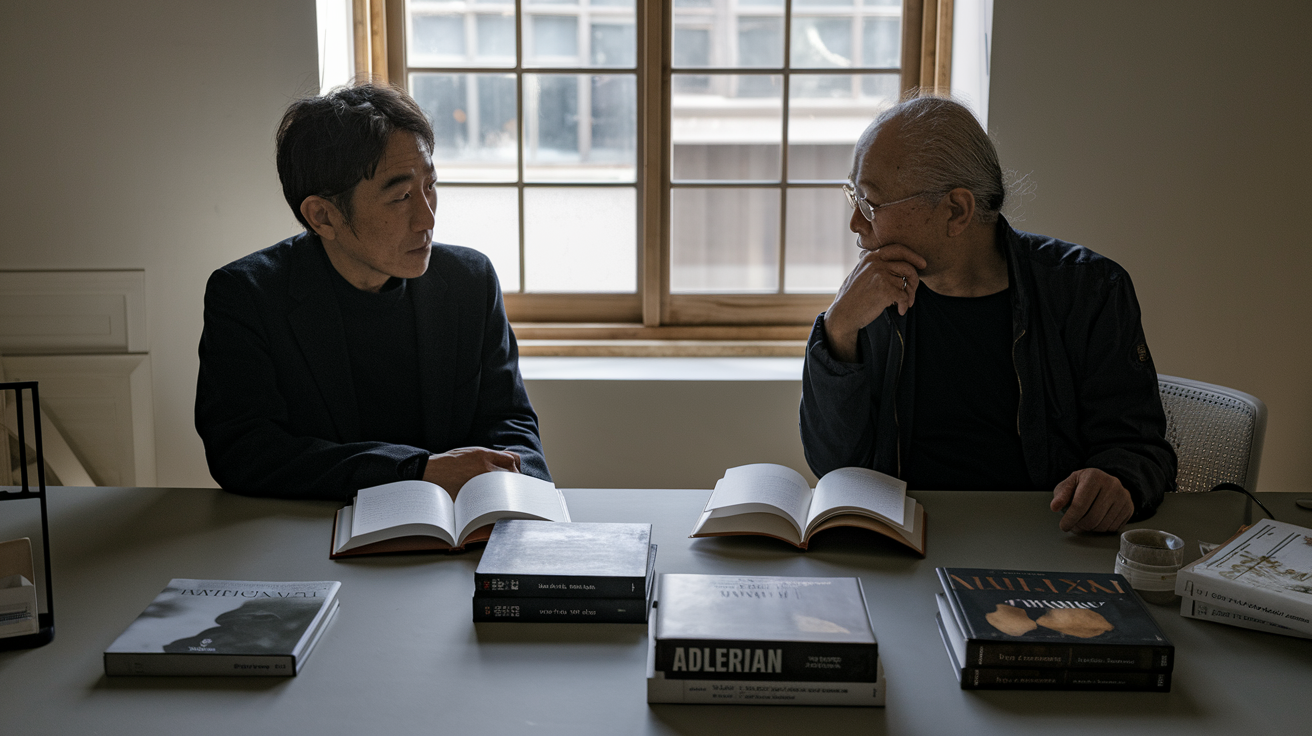The Courage to Be Disliked Review: Key Adlerian Concepts Explained
This comprehensive “Courage to Be Disliked” book review explores Ichiro Kishimi and Fumitake Koga’s transformative dialogue on Adlerian psychology and personal freedom.

Why does happiness often feel just out of reach, no matter how hard we chase it? In a society driven by the need for approval, The Courage to Be Disliked challenges this pursuit with a radical idea: seeking praise only complicates life, forcing us to bend over backward for others. Instead, true freedom lies in living authentically. Millions have already discovered life-changing insights through the philosophy of Alfred Adler — a revolutionary thinker whose influence stands alongside Freud and Jung — brought to life here by authors Ichiro Kishimi and Fumitake Koga.
What makes this book especially engaging is its unique format: a dialogue between a restless young man and a wise philosopher, unfolding over five evenings. Much like decluttering your home, it helps you tidy up your mental space, unpacking the limiting beliefs that trap us in cycles of dissatisfaction. Its central message is clear: your past does not dictate your future. Fulfillment comes from self-acceptance, taking ownership of your choices, and refusing to carry the weight of other people’s expectations.
This comprehensive review of The Courage to Be Disliked: The Japanese Phenomenon That Shows You How to Change Your Life and Achieve Real Happiness offers a thoughtful guide to Adlerian psychology. Whether you’re seeking personal growth or exploring new perspectives on wellness, Kishimi and Koga’s work invites you to rethink happiness and embrace a more authentic way of living.
🎥 Prefer an audio‑style experience? Watch and listen to the full review here.
SHORT VIDEO reflection on The Courage to be Disliked by Ichiro Kishimi and Fumitake Koga.
Understanding Adlerian Psychology: The Foundation of “The Courage to Be Disliked”

Who was Alfred Adler, and how do his theories differ from contemporary psychology
Alfred Adler, an Austrian psychotherapist and contemporary of Freud, laid the philosophical foundation for The Courage to Be Disliked. Unlike Freud’s emphasis on how past experiences shape present behavior, Adlerian psychology takes a radically different stance. It focuses on self-determination, personal agency, and the belief that individuals can choose their path forward. Rather than attributing behavior to unconscious drives or childhood traumas, Adler’s approach empowers people to take control of their choices in the present moment.
The fundamental belief that we can reshape our futures regardless of past experiences
One of Adler’s most revolutionary ideas, highlighted throughout the book, is that our past does not dictate our future. While early experiences influence our perspectives, they are not fixed traits that define us permanently. Adler argues that anyone can change their outlook and self-perception right now. This concept challenges deterministic views and encourages readers to embrace new ways of thinking, proving that conscious choices can reshape our lives regardless of history.
How Adlerian psychology challenges traditional views on trauma and happiness
Adlerian psychology offers a refreshing counterpoint to conventional approaches. Instead of focusing on trauma or self-hatred rooted in the past, Adler suggests that negative self-perceptions often stem from imagined feelings of inferiority rather than objective shortcomings. The book guides readers to separate real limitations from self-imposed barriers, opening the door to stronger connections with others.
Adler also critiques competitive mindsets, arguing that rivalry damages mental health. He advocates for shifting from scarcity thinking to an abundance mentality, promoting collaboration and growth over competition. Happiness, in this view, comes from cooperation and contribution rather than comparison.
Key Adlerian principles: separation of tasks and horizontal relationships
Two standout ideas in the book are the separation of tasks and the use of horizontal relationships. Separation of tasks teaches us to distinguish between what we can control and what belongs to others, preventing unhealthy dynamics where we take on responsibilities that aren’t ours. Horizontal relationships emphasize equality over hierarchy, encouraging authentic connections built on respect rather than dominance.
Now that we’ve explored the foundational principles of Adlerian psychology, the book’s unique format — a dialogue between a philosopher and a young seeker — brings these concepts to life in a way that feels both practical and deeply engaging.
The Unique Format and Structure of the Book

Now that we have explored the foundational principles of Adlerian psychology that underpin “The Courage to Be Disliked,” let’s examine the distinctive format that makes this philosophical work so accessible and engaging.
The Socratic Dialogue Between the Philosopher and the Youth
Unlike conventional self-help books, “The Courage to Be Disliked” employs a Socratic dialogue format, presenting its ideas through conversations between two characters: a wise, reclusive philosopher and a skeptical young man. This narrative device creates a dynamic exchange where the youth, who struggles with societal and familial expectations, challenges the philosopher’s assertion that anyone can achieve happiness at any moment. The dialogue unfolds as a point-counterpoint, with the youth voicing doubts and objections that many readers might share, while the philosopher offers Adlerian insights.
This conversational approach avoids the confusion often found in traditional plays while maintaining the engaging quality of a story. As the youth grapples with concepts like self-acceptance and interpersonal relationships, readers witness the transformation of complex psychological theories into practical wisdom.
The Five-Night Journey of Philosophical Exploration
The book structures its philosophical exploration across five distinct “nights” or sessions between the philosopher and the youth. This journey progresses systematically, with each night building on the insights from previous discussions, creating a natural learning curve for both the youth and the reader.
During these five nights, the philosopher gradually introduces key Adlerian concepts—from the subjective nature of reality to the importance of community contribution. The youth initially resists these ideas, particularly the notion that one can choose happiness regardless of past experiences. However, as the dialogue advances, he begins to understand and embrace these principles, ultimately expressing a newfound appreciation for life and the potential for happiness in the present.
How This Conversational Style Makes Complex Ideas Accessible to Readers
The dialogic structure of “The Courage to Be Disliked” serves as an effective pedagogical tool, making abstract psychological theories remarkably accessible. By presenting ideas through conversation rather than academic exposition, the authors allow readers to:
- See immediate challenges and responses to each concept
- Process information incrementally rather than being overwhelmed
- Witness the practical application of theories to real-life situations
- Identify with the youth’s skepticism and gradual enlightenment
The philosopher’s straightforward language and clear explanations demystify complex Adlerian concepts. Rather than presenting psychology as an esoteric field, the book frames it as practical wisdom for everyday living. Through this dialogue, readers can understand profound ideas like the separation of tasks, teleology versus etiology, and the courage to face interpersonal relationships.
By the conclusion of their exchanges, the youth transforms from a cynical questioner into someone who recognizes the value of contributing to the community and of embracing the present moment, mirroring the journey readers themselves might experience.
With this understanding of the book’s unique format, we can now delve deeper into the key concepts it presents and how they can transform your perspective on life.
Courage to Be Disliked Book Review: Key Adlerian Concepts

Now that we’ve explored the unique dialogue between the philosopher and the young man in “The Courage to Be Disliked,” let’s delve into the transformative concepts at the heart of Adlerian psychology that underpin this thought-provoking work.
Why do all problems stem from interpersonal relationships?
According to Adler’s psychological framework, all personal problems fundamentally originate from our interpersonal relationships. Unlike Freudian psychology, which focuses on past traumas as determinants of our behavior through a deterministic lens, Adlerian psychology takes a teleological approach, examining the purposes and meanings we assign to our experiences and relationships.
The book illustrates how our insecurities about self-worth and the fear of being exposed to others create most of our psychological challenges. When we feel inadequate or fear judgment, we develop defensive behaviors that ultimately harm our connections with others. These relationship difficulties aren’t merely symptoms of our problems—they constitute the problems themselves.
The power of accepting yourself and others without conditions
Adler emphasizes that self-acceptance is crucial for psychological health. The philosophy presented in “The Courage to Be Disliked” suggests that being comfortable with yourself, including your perceived flaws and limitations, allows you to approach relationships with authenticity rather than defensiveness.
This self-acceptance isn’t about resignation but reframing. Adler distinguishes between feelings of inferiority, which can motivate improvement, and the debilitating inferiority complex. By viewing shortcomings as opportunities for growth rather than permanent defects, we develop a healthier relationship with ourselves and others.
The book teaches that once we accept ourselves unconditionally, we can extend that same acceptance to others, fostering genuine connections rather than conditional ones based on approval or usefulness.
Breaking free from the desire for others’ approval
One of the most liberating concepts in Adlerian psychology is the idea of freeing oneself from the need for external validation. The book argues that constantly seeking others’ approval is both exhausting and counterproductive, as it places our sense of worth in others’ hands.
The philosopher in the dialogue encourages embracing the possibility of being disliked as a pathway to authenticity. This doesn’t mean deliberately antagonizing others; instead, it means recognizing that it’s impossible to please everyone while remaining true to yourself. When we stop competing for approval and focus on personal growth and self-improvement, we measure success by our own standards rather than comparing ourselves to others.
Distinguishing between your tasks and others’ tasks
A profound concept explored in the book is the importance of task separation—identifying which responsibilities belong to you and which to others. Adler suggests that individuals should focus only on what they can control, a principle that echoes Stoic philosophy.
This separation prevents unhealthy dependencies and manipulative behaviors. For example, while you can offer support to someone facing challenges, their emotional response remains their task, not yours. Similarly, others’ opinions about you are their tasks, not something you need to manage or control.
By respecting these boundaries, we avoid the common pitfalls of codependency, excessive people-pleasing, and taking responsibility for others’ feelings. This clarity allows us to engage in more honest, respectful relationships while maintaining our integrity.
With this understanding of how Adlerian psychology transforms our perspective on relationships, self-acceptance, approval-seeking, and personal responsibility, we’ll next explore how “The Courage to Be Disliked” challenges conventional thinking and why this challenge requires genuine courage.
The Courage to Challenge Conventional Thinking

Now that we’ve explored the key concepts that transform our perspective on life according to Adlerian psychology, let’s examine how “The Courage to Be Disliked” challenges conventional thinking about our past, present, and future.
Why trauma doesn’t determine your future
One of the most revolutionary aspects of the Adlerian approach presented in this book is the rejection of determinism. Unlike Freudian psychology, which often views past traumas as determinants of future behavior, Adlerian psychology holds that individuals are not defined by their experiences but by the meanings they assign to them.
The book draws on principles of Individual Psychology, emphasizing that while factors such as heredity and environment influence our behavior, they do not dictate it. We retain agency to choose our thoughts and actions in response to life’s challenges. This perspective is compelling for those who have faced significant hardships, as it suggests that with proper support and a focus on strengths, individuals can overcome adversity rather than being permanently defined by it.
The authors argue against labeling individuals as victims, suggesting that such categorization can hinder recovery and healthy functioning. Instead, they advocate for promoting resilience and personal growth, even in the face of severe difficulties.
How we assign meaning to our experiences and create our reality
Central to the book’s philosophy is the concept that human behavior is goal-oriented rather than causally determined. We actively interpret events and assign meaning to our experiences, thereby creating our reality.
The authors illustrate how two people can experience identical events yet derive completely different meanings from them based on their perspectives and goals. This understanding challenges readers to examine how they might be unconsciously creating interpretations that limit their potential or happiness.
Through the dialogue between the philosopher and the youth in the book, readers are guided to recognize patterns in their interpretations and to question whether these patterns serve their current goals and well-being. The book suggests that by becoming aware of how we assign meaning, we gain the power to reassign more constructive meanings.
Shifting focus from past experiences to present goals
“The Courage to Be Disliked” encourages a fundamental shift from dwelling on past experiences to focusing on present goals. The therapeutic approach outlined in the book involves four key stages: engagement, assessment, insight, and reorientation.
While the assessment stage involves exploring one’s personal history, including family dynamics and early memories, the ultimate goal is not to become fixated on these past events but to gain insight into current behavioral patterns. The insight stage helps readers recognize these patterns, while the reorientation stage focuses on developing new habits and skills to support growth and present goals.
This future-oriented approach is efficient for addressing feelings of inferiority and promoting social connections. By focusing on present goals rather than past wounds, individuals can break free from self-limiting beliefs and behaviors.
The authors emphasize that behavior is influenced by one’s sense of belonging within their community and societal context. By shifting focus to how one can contribute positively to their social environment rather than being preoccupied with past hurts, individuals can find greater meaning and satisfaction.
With this understanding of how to challenge conventional thinking about our past and present, we’ll next explore the path to authentic happiness as interpreted by Kishimi and Koga in the context of Adlerian psychology.
The Path to Authentic Happiness

Now that we’ve explored how “The Courage to Be Disliked” challenges conventional thinking, let’s examine how Kishimi and Koga guide readers toward achieving authentic happiness through Adlerian psychology.
Why seeking validation from others leads to an unfulfilling life
According to Kishimi and Koga, the pursuit of external approval is a primary obstacle to genuine happiness. Individuals who constantly seek validation from others often sacrifice their desires and authentic selves, resulting in a life dictated by external expectations rather than personal values. This endless quest for approval is particularly problematic because it’s fundamentally unattainable – external validation is conditional and fleeting.
The authors explain that while humans may have a biological predisposition to seek social validation, as evidenced by neuroscientific research on the brain’s default network, this doesn’t mean we must live at the mercy of others’ opinions. When we prioritize external approval, we typically adopt one of two harmful coping mechanisms: either we stop trying altogether, leading to self-loathing and fear, or we develop limiting beliefs that absolve us of responsibility for our happiness.
As the book reveals, both paths lead to unfulfillment and a disconnect from our authentic selves. The concept of “radical responsibility” emphasized in the text suggests that taking ownership of our problems, regardless of their origins, is essential for breaking free from the validation trap.
The importance of community and belonging without hierarchy
Adlerian psychology, as presented in the book, emphasizes community as essential to happiness, but with an important distinction: true community thrives without competitive hierarchies. The authors argue that viewing others as comrades rather than competitors is vital for authentic relationships and personal well-being.
This perspective transforms how we engage with our communities. Rather than positioning ourselves above or below others, we can foster relationships based on mutual respect and equality. The book introduces the concept of “horizontal relationships,” in which individuals contribute to the community not to gain status or recognition, but simply because contributing creates meaning and fulfillment.
Kishimi and Koga emphasize that genuine happiness comes through contribution rather than validation. By shifting our focus from what we can receive to what we can give, we discover a more sustainable source of joy and purpose. This approach aligns with Adler’s view that community involvement fulfills our fundamental need for belonging while preserving our independence and authenticity.
How refraining from praise and rebuke creates healthier relationships
One of the most counterintuitive aspects of the book’s philosophy is the authors’ critique of traditional reward-and-punishment systems. Kishimi and Koga argue that praise and rebuke, while seemingly opposite, share the same problematic foundation: they both establish external criteria for determining a person’s worth.
When we praise someone, we implicitly communicate that their value depends on meeting certain expectations. Similarly, when we criticize, we suggest they’ve failed to meet those standards. Both approaches can lead to “mistaken motivations,” in which individuals act not from authentic desire but from fear of disapproval or hope for recognition.
The authors advocate a different approach to relationships—one that respects others’ autonomy and focuses on “separation of tasks.” This principle encourages us to recognize the boundaries between what we’re responsible for and what belongs to others. By refraining from excessive praise or criticism, we allow others to develop their internal compass rather than becoming dependent on external validation.
Embracing the courage to be disliked for true personal freedom
The book’s titular concept represents its most profound insight: true freedom requires the courage to be disliked. When we free ourselves from the need for universal approval, we can live authentically in line with our values.
This courage isn’t about deliberately antagonizing others or disregarding their feelings. Instead, it’s about recognizing that disapproval from others is inevitable when we live authentically, and choosing to proceed anyway. The authors maintain that this path leads to genuine self-acceptance and to a more honest engagement with life.
Living with the courage to be disliked means focusing on the present moment rather than dwelling on past grievances or future anxieties. The book describes life not as a linear journey but as a series of moments that deserve our full, earnest engagement. By embracing this perspective, we free ourselves from the burden of others’ expectations and discover a more authentic form of happiness.
With this understanding of how Adlerian principles guide us toward authentic happiness, let’s now turn our attention to the authors behind this transformative philosophy, exploring how Kishimi and Koga’s backgrounds influenced their presentation of these ideas.
“You are not living for others — you are living for yourself.”
The Authors Behind the Philosophy

Now that we have explored the path to authentic happiness as presented in “The Courage to Be Disliked,” let’s turn our attention to the brilliant minds behind this philosophical masterpiece. Understanding the authors’ backgrounds provides valuable context for appreciating how this transformative work came to be.
Ichiro Kishimi’s Background as a Philosopher and Counselor
Ichiro Kishimi, born in 1956 in Kyoto Prefecture, Japan, has established himself as a distinguished philosopher and psychologist with particular expertise in Western ancient philosophy and Adlerian psychology. His academic journey began at the prestigious Kyoto University. However, he made the significant decision to leave his doctoral program in 1987 to care for his mother. This choice perhaps reflects the values of personal responsibility and human connection that later feature prominently in his work.
Throughout his career, Kishimi has held various academic positions at respected institutions, including Kyoto University of Education and Nara Women’s University. His practical experience includes clinical work in the psychiatric department of Maeda Clinic, providing him with firsthand insight into the application of psychological principles. As a certified counselor with the Japanese Society of Adlerian Psychology and an advisor to the organization, Kishimi has demonstrated both theoretical knowledge and practical expertise in the field.
Kishimi’s personal experiences, including health challenges and family caregiving responsibilities, have profoundly influenced his philosophical outlook. These life circumstances seem to have deepened his appreciation for philosophy as a practical tool for navigating life’s difficulties—a perspective that shines through in “The Courage to Be Disliked.”
Fumitake Koga’s Transformative Encounter with Adlerian Psychology
While the reference material provides limited specific information about Fumitake Koga’s background, we know that his collaboration with Kishimi proved to be extraordinarily fruitful. The partnership between these two minds resulted in the groundbreaking presentation of Adlerian concepts in a highly accessible format.
Koga’s contribution to the book’s dialogue format—featuring exchanges between a youth seeking answers and a philosopher offering guidance—helped create the engaging Socratic method that makes complex philosophical ideas approachable to readers worldwide.
How Their Collaboration Created a Global Phenomenon
The collaboration between Kishimi and Koga resulted in the publication of “The Courage to Be Disliked” in 2013. The book’s impact was immediate and substantial, achieving bestseller status and selling over one million copies. This remarkable success speaks to both the timeless relevance of Adlerian psychology and the authors’ skill in presenting these concepts in an engaging, accessible manner.
Since the book’s publication, Kishimi has continued to share his insights on philosophy and Adlerian psychology through his contributions to “Courrier Japon,” beginning in 2017. This ongoing work helps to disseminate further the valuable concepts presented in “The Courage to Be Disliked.”
The book’s unique structure—a five-night dialogue between a youth and a philosopher—effectively communicates complex ideas about self-acceptance, freedom, equality, and personal agency. This innovative approach to presenting philosophical concepts has resonated with readers seeking practical wisdom for navigating life’s challenges.
With this understanding of the minds behind this philosophical phenomenon, we can now examine the broader impact and reception of “The Courage to Be Disliked” around the world, which we’ll explore in the next section.
The Impact and Reception of “The Courage to Be Disliked”

Having explored the philosophical backgrounds of Kishimi and Koga, we can now examine how their collaborative work has resonated with audiences worldwide and the remarkable journey this book has taken since its publication.
From a Japanese bestseller to an international success
“The Courage to Be Disliked” began as a Japanese publication in 2013 and quickly gained recognition for its accessible presentation of complex psychological principles. What started as a domestic success story soon transformed into a global phenomenon. The book’s unique dialogue format between a philosopher and a young man made the Adlerian psychology approachable for readers across cultural boundaries, facilitating its transition from an Eastern bestseller to worldwide acclaim.
The book’s international success demonstrates how universal the core themes of self-acceptance, personal agency, and authentic living truly are. Despite originating in Japan, the principles of Adlerian psychology, as presented by Kishimi and Koga, have proven to transcend cultural differences, speaking to fundamental human desires for freedom and self-determination.
Notable endorsements and critical acclaim
Critics and thought leaders have widely praised “The Courage to Be Disliked” for its refreshing approach to personal development. The book has been lauded for making complex psychological ideas accessible through its engaging narrative style and practical advice. Its thought-provoking exploration of individual responsibility and authenticity has earned it a distinctive place in the self-help genre.
While the book has received significant acclaim for its empowering messages about self-acceptance and living in the present, some critics have noted that it occasionally oversimplifies Adlerian concepts and can become repetitive in its delivery. Nevertheless, these critiques have done little to diminish the book’s standing as a significant contribution to contemporary self-help literature.
How readers worldwide have applied these principles to transform their lives
Perhaps the most compelling testament to the book’s impact comes from the countless readers who have applied its principles to transform their lives. Many have found inspiration in the book’s empowering message about rejecting limiting beliefs and societal pressures. By embracing the courage to be disliked—accepting that seeking universal approval is both impossible and unnecessary—readers have reported newfound freedom in their personal and professional lives.
The book’s emphasis on “social interest” has helped readers recognize the importance of community connection while maintaining healthy boundaries. Many have successfully applied the principle that true fulfillment comes from within rather than external validation, leading to more authentic relationships and greater personal satisfaction.
Readers worldwide have particularly responded to the concept of “fictional finalism”—the idea that subjective interpretations of reality guide actions—by reevaluating their narratives and taking responsibility for their happiness. By focusing on the present moment rather than dwelling on the past, many have reported significant shifts in their approach to life’s challenges, viewing them as opportunities for contribution and growth rather than obstacles.
Through its practical application of Adlerian psychology, “The Courage to Be Disliked” continues to inspire individuals to reclaim their happiness and live more meaningfully, cementing its place as not just a bestseller but a catalyst for personal transformation across cultures.

“The Courage to Be Disliked” offers more than philosophical discourse—it presents a roadmap to personal transformation through the lens of Adlerian psychology. Throughout this exploration, we’ve witnessed how Kishimi and Koga masterfully challenge conventional thinking about happiness, interpersonal relationships, and self-acceptance through their engaging Socratic dialogue. The book’s revolutionary message—that we can free ourselves from past traumas, embrace being disliked, and take ownership of our happiness—has resonated with millions worldwide since its publication.
As you close this book, consider embracing its central premise: true happiness comes not from external validation but from courageously accepting yourself and others. The wisdom shared by Kishimi, a respected Adlerian psychologist, and Koga, who experienced personal transformation through these principles, invites us to examine our own lives with a fresh perspective. Whether you’re seeking to improve relationships, find authentic happiness, or declutter your mental space, the courage to challenge your perceptions about life may be the first step toward meaningful change. The question remains not whether these principles can work, but whether you’re ready to summon the courage to apply them.
This book reminded me that freedom begins when we stop chasing approval.
📚 Get Your Copy
Ready to break free from negative thought patterns?
→ Get The Courage To Be Disliked on Amazon
As an Amazon Associate, I earn from qualifying purchases at no extra cost to you.
Related Book Reviews You Might Like
- Atomic Habits – Practical techniques for changing thought patterns
- Can’t Hurt Me – Mental resilience and overcoming self-doubt
📚 Love soulful reads and life-changing insights? Subscribe to The Zen Journal and receive thoughtful book reviews, personal growth reflections, and mindful living tips — straight to your inbox.
